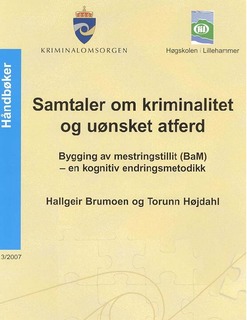| dc.contributor.author | Brumoen, Hallgeir | |
| dc.contributor.author | Højdahl, Torunn | |
| dc.date.accessioned | 2011-05-20T13:55:31Z | |
| dc.date.available | 2011-05-20T13:55:31Z | |
| dc.date.issued | 2007 | |
| dc.identifier.isbn | 978-82-91910-72-7 | |
| dc.identifier.uri | http://hdl.handle.net/11250/160499 | |
| dc.description.abstract | BaM is a self-efficacy enhancing method within the category of Cognitive Behavioural Therapy (CBT). Central in the method is to avoid expert positioning towards the participant, who may have had the unfortunate experience of being lectured on his life. We try to avoid reactant behaviour. This handbook is addressed to facilitators in the Correctional Service. The primary objective of the method is to enhance the ability to restrain from committing (new) crime in high-risk situations.
The purpose of BaM is to bring forth non-normative descriptions of situations in which the participant either committed a crime or managed to restrain himself from doing so. These descriptions are respectively referred to as ‘moments of weakness’ and ‘moments of strength’. In both cases the participant describes an episode he experienced, while the facilitator writes the descriptions on a flip-over in accordance to a certain analytic scheme. The participant is the storyteller who knows his story, and the staff member functions as a pedagogic facilitator. The causes of criminal and/or unwanted behaviour are sought in mechanisms connected to the behaviour itself. The concept of a freedom of choice is fundamental to BaM, but we regard the possibility of choice as a question of sufficient self-efficacy to stop oneself in high-risk situations, to understand them and to carry out more desirable actions instead of crime. We focus on “here and now” situations.
‘Moments of weakness’ describe how the forces in a given situation can make the participant commit a crime. The causes of the behaviour are attributed to the situation, not the person. By this we try to lessen the participant's sense of guilt and show that the causes are found in mechanisms controlling behaviour; they are not attributed to the person's will or intentions. The approach should give the participant both a sense of being attended to and an understanding of the general human tendency to repeat learned behaviour. This can create an alliance between the participant and the facilitator, which in turn may provide the participant with a stepping-point for challenging his own unwanted behaviour.
‘Moments of strength’ focus on a situation in which the participant easily could have committed a crime, but managed to do otherwise by creating a ‘moment of truth’ for himself. In moments of strength we focus on coping, and we engage in past events in a solution-focused and “exception to-the-rule” tradition.
The ‘moment of truth’ is a pedagogical term signifying the mental ability to “stop the time” and “arrest” a situation in order to take control over one’s actions. This is a choice making use of cognitive executive control-functions in order to push forward an alternative act. | en_US |
| dc.description.sponsorship | Utgitt i samarbeid med Høgskolen i Lillehammer | en_US |
| dc.language.iso | nob | en_US |
| dc.publisher | Kriminalomsorgens utdanningssenter | en_US |
| dc.relation.ispartofseries | Håndbøker;3/2007 | |
| dc.subject | BAM | en_US |
| dc.subject | FAK-skjemaer | en_US |
| dc.subject | Innsatte | en_US |
| dc.subject | Prisoners | en_US |
| dc.subject | Inmates | en_US |
| dc.subject | Cognitive behavioural therapy | en_US |
| dc.title | Samtaler om kriminalitet og uønsket atferd: bygging av mestringstillit (BaM) -en kognitiv endringsmetodikk | en_US |
| dc.type | Book | en_US |
| dc.subject.nsi | VDP::Social science: 200::Psychology: 260 | en_US |
| dc.source.pagenumber | 142 | en_US |
